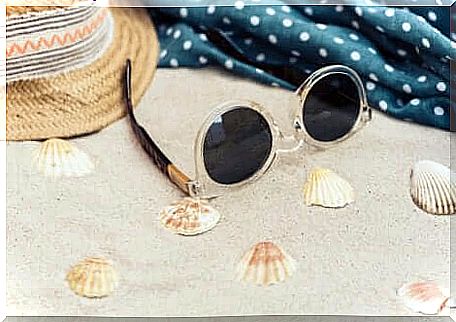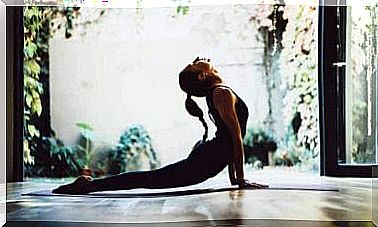How To Protect Your Eyes In Summer?
Protecting your eyes in summer is absolutely necessary. UV rays have powerful effects on this organ. If left unchecked, it could lead to serious eye disease.

It is very important to protect your eyes in summer as they are susceptible to aggression due to environmental conditions. The sun is a source of heat, light and UV rays; it is the latter which represent a danger to visual health.
According to specialists at the American Academy of Ophthalmology , summer is one of the most dangerous times of the year for eye health. Without proper protection, the eyes can suffer from serious problems, such as cataracts. What preventive measures should we take? Discover them now!
Habits to protect your eyes in summer
Protecting your eyes in summer is actually very simple. It is only a question of integrating certain simple practices and transforming them into daily habits. The first of these is to use dark or semi-dark sunglasses, with a sun filter, every time you go out on the street.
The best thing is that it is the optometer that recommends the sunglasses that each person should wear, according to their particularities. Under normal conditions, filter glasses 3 are used and this number should appear circled on one of the bars of the glasses.
In addition, and for obvious reasons, the glasses must benefit from a UV400 filter. They thus make it possible to protect the eyes to a percentage ranging from 99 to 100%.
On the other hand, polarized glasses are the most suitable for those who spend a lot of time outdoors. It should always be purchased from a trusted store, and preferably from the optician.
It should be noted that the optometer will be responsible for recommending the appropriate sunglasses for people with a visual impairment. As a rule, glasses with lighter colors are indicated for people with nearsightedness and darker ones, for farsighted people, for example.

Adequate habits
It is never good to look directly at the sun. You shouldn’t do it, even with glasses on your nose. It is also not advisable to stay exposed to the sun for extended periods of time, let alone during the central hours of the day, when the radiations are more powerful and close to the Earth.
If you wear contact lenses, you should wear sunglasses to protect your eyes in the summer. There are UV filtered lenses that are highly recommended, but you should prioritize protection with sunglasses.
Whether it is to protect your skin or to protect your eyes, it is best to put yourself in the shade. Also, wearing a hat or something that covers the head is extremely desirable.
A risk factor that increases in summer is air conditioning, which works much more than at other times of the year. These devices can cause dryness in the eyes, which can be prevented by putting artificial drops that do not contain preservatives. Likewise, we can use eye drops, if the oculist has advised us to do so.
Other treatments to protect your eyes in summer
During the summer period it is very common to go to the swimming pool to cool off. However, there are huge amounts of chlorine. It is a powerful disinfectant that can cause eye irritation and even allergies.
In addition, it can happen, despite the use of chlorine, that bacteria proliferate there and cause conjunctivitis, such as Acanthamoeba. What should we do then? The ideal is not to have direct contact with the water, something that can be achieved by using diving goggles.
Sharing a towel at the pool is not recommended, either in showers or by the water. Also, if possible, you should avoid touching your eyes, even if they sting or burn you. You should also not put on makeup if you think you are going into the water.
The lens of babies and children filters UV rays with a much lower efficiency than that of adults. Therefore, to protect their eyes in summer, it is very important to pay them special attention. In general, they should always wear sunglasses and a hat.

Illnesses deriving from UV rays
UV rays trigger effects of different intensities in the eyes. At first, they cause reddening, irritation and blurred vision. If we do not take the right measures, over time the consequences are much worse.
Specialists associate certain types of cataracts with prolonged exposure to the sun. This disease gradually decreases vision and can even lead to blindness. Another possible effect is the formation of a pterygium, which is a kind of outgrowth growing on the surface of the cornea.
There is also the risk of developing photokeratitis or degenerative changes in the cornea which undoubtedly affect vision significantly.









